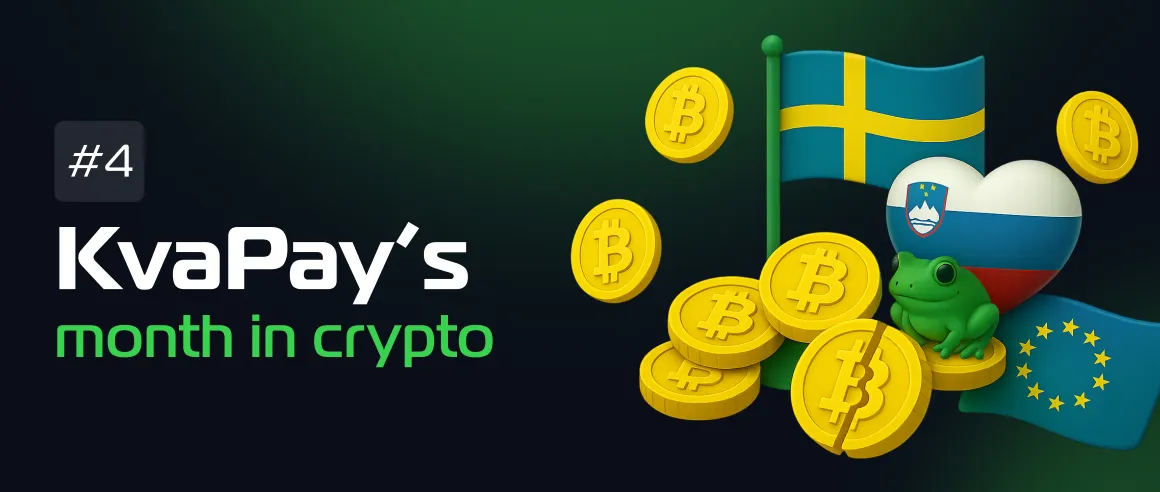Adoption of cryptocurrencies across Europe is growing. People want to pay and buy crypto
Sweden Considers Adding Bitcoin to Foreign Exchange Reserves
A Swedish MP, Rickard Nordin, has proposed creating a "budget-neutral" Bitcoin reserve to the country's finance minister, Elisabeth Svantesson. This move is inspired by a recent executive order signed by US President Donald Trump, which aims to create a national Bitcoin reserve in the US.
While the US is moving forward with its Bitcoin reserve plan, European lawmakers have remained relatively silent on Bitcoin legislation. The European Union is instead focusing on launching a central bank digital currency (CBDC), the digital euro, by October this year. The approach of the EU is in contrast to the US, where Trump has prohibited the establishment of a US dollar-based CBDC.
Bitwise Expands to London Stock Exchange
Bitwise has listed four crypto exchange-traded products (ETPs) on the London Stock Exchange, including the Bitwise Core Bitcoin ETP, Physical Bitcoin ETP, Physical Ethereum ETP, and Ethereum Staking ETP. These products are available to institutional or qualified investors, but not to retail investors in the United Kingdom.
Bitwise's expansion to the London Stock Exchange is part of its broader strategy to increase institutional interest in crypto and legitimacy of the asset class. The company is also pursuing ETF listings in the US, including a proposed Dogecoin ETF and Aptos ETF. Regulatory shifts in the US, such as the departure of SEC Chairman Gary Gensler, have led to a surge in crypto ETF applications, with Bitwise predicting $50 billion in inflows for Bitcoin ETFs in 2025.
Spar Supermarket in Switzerland Now Accepts Bitcoin Payments
Spar, a global grocery giant, has rolled out Bitcoin-based payments in a Swiss city, marking another step in the growing adoption of cryptocurrency for everyday transactions. The Spar supermarket in Zug, Switzerland, has implemented Bitcoin payments via the Lightning Network, allowing customers to pay directly at the checkout using a QR code.
Switzerland has been at the forefront of crypto adoption, with over 1,013 stores and businesses accepting Bitcoin payments. This is part of a broader trend of increasing mainstream trust in cryptocurrency payments, particularly among retail giants with a global presence. The move is seen as a significant step forward in making cryptocurrency more accessible and user-friendly for everyday transactions.
Slovenia's Ljubljana Ranked as World's Most Crypto-Friendly City
Ljubljana, the capital of Slovenia, has been named the world's most crypto-friendly city by migration advisory firm Multipolitan. The city outranked runners-up Hong Kong and Switzerland's economic powerhouse Zürich in the Crypto-Friendly Cities Index, which evaluated 20 cities based on their regulations, tax environment, lifestyle factors, and digital and crypto infrastructure. The index considered factors such as licensing frameworks, capital gains tax rates, and the presence of crypto ATMs to determine the top scores.
Slovenia's crypto-friendly environment has also been reflected in its high concentrations of crypto assets, with the average Slovenian crypto owner holding around $240,500 worth of assets. The country's finance ministry has also proposed a 25% tax on crypto transactions. Ljubljana is home to the Blockchain Alliance Europe and the blockchain real estate platform Blocksquare, which has partnered with Vera Capital to tokenize $1 billion worth of US real estate.
The European Union continues its aloof approach to cryptocurrencies. And it is a great pity!
EU Markets Regulator Warns of Crypto Risks
The European Securities and Markets Authority (ESMA) has expressed concerns about the growing ties between crypto and traditional financial markets. ESMA's executive director, Natasha Cazenave, warned that sharp price falls in crypto could disrupt the broader market and potentially have knock-on effects on the financial system. Although crypto currently accounts for only 1% of global financial assets, Cazenave noted that interconnections between crypto and traditional markets are rapidly growing.
Cazenave highlighted the need for closer monitoring of crypto developments, citing recent hacks, scams, and scandals. The European Union has implemented measures such as the Markets in Crypto-Assets (MiCA) regulation to safeguard against crypto risks. She also noted that crypto adoption is growing in Europe, with an estimated 10-20% of European investors having crypto exposure, although the US has a higher adoption rate of 15-28%.
European Central Bank's Push for Digital Euro
The European Central Bank (ECB) is intensifying its warnings over the adoption of stablecoins, citing concerns over the growing influence of US dollar-pegged stablecoins in Europe. ECB executive board member Piero Cipollone has called for a digital euro to counter the dominance of dollar-backed stablecoins and preserve the eurozone's monetary sovereignty. Cipollone argues that a digital euro would limit the potential for foreign currency stablecoins to become a common medium of exchange within the euro area.
Cipollone highlighted the importance of cash in ensuring financial inclusion and resilience, but noted that its use is limited in online transactions. He emphasized the need for a digital euro to promote cash and reduce dependence on foreign companies. However, the proposed digital euro has faced criticism and skepticism among European consumers, particularly regarding data privacy concerns. An ECB working paper showed that European consumers are not interested in adopting a digital euro, with many seeing little value in the potential central bank digital currency (CBDC).

